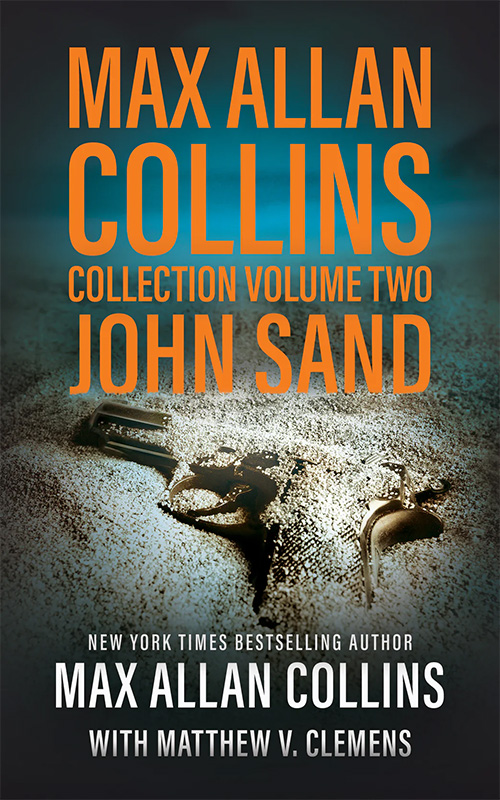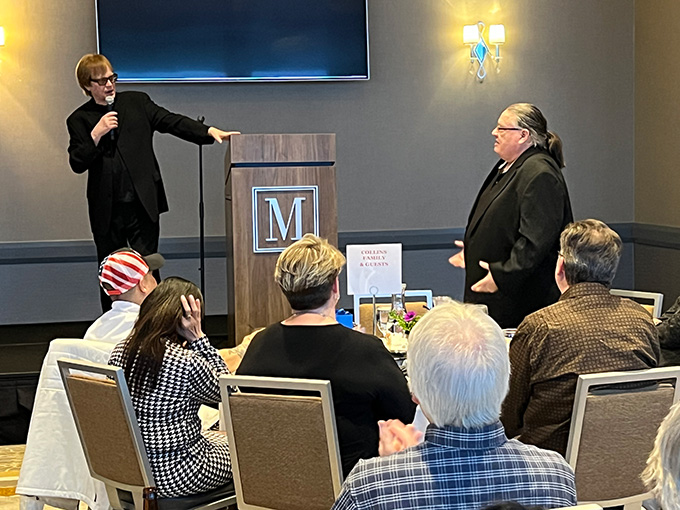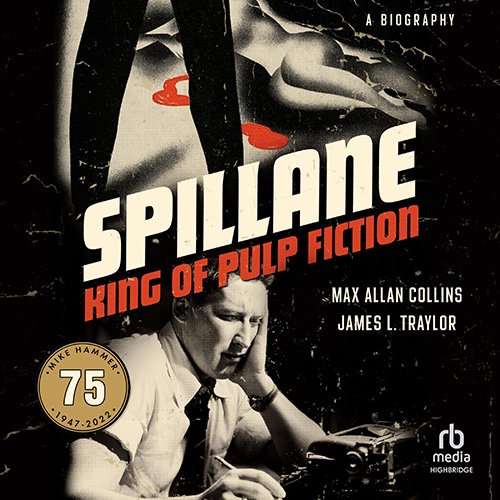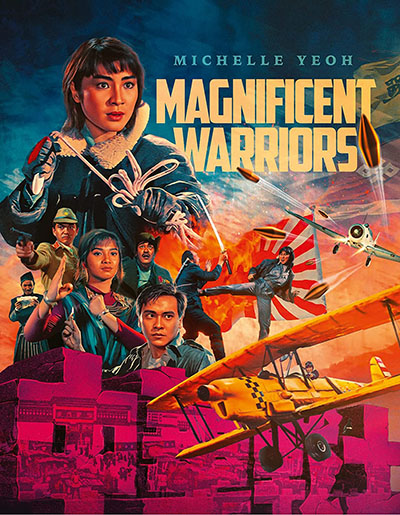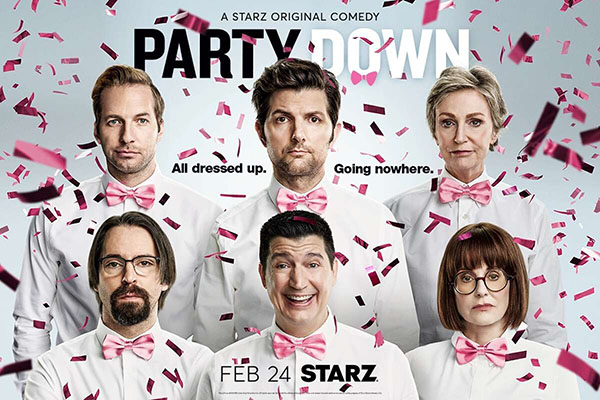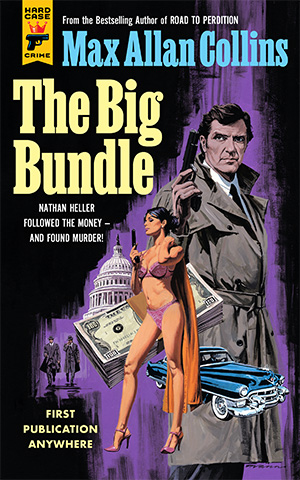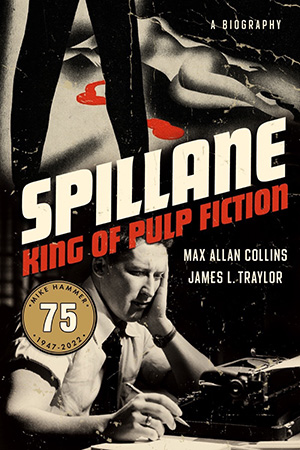This new e-book collection of the three John Sand spy thrillers by Matthew Clemens and me is available from Wolfpack and, for the first time, includes Murderlized, a collection of our stories, one of which is the first John Sand story.
An informal meeting of Quad Cities area filmmakers was put on at dphilms on Saturday, April 24. Since I‘ve largely been away from indie filmmaking in the area – though of course I’ve done some screenwriting in the interim – it was a nice opportunity to see some new and old (and in between) faces.
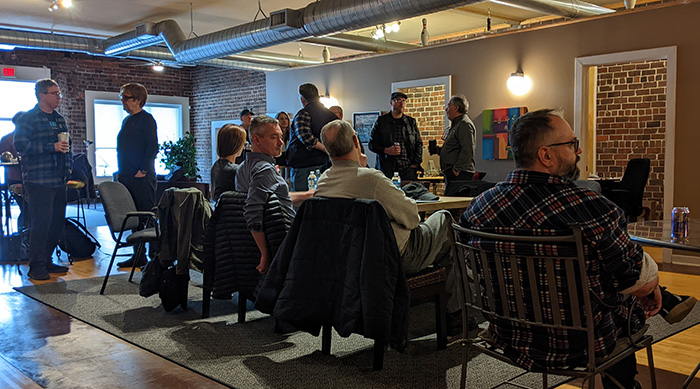
Quad Cities Filmmakers Meet at Dphilms, Rock Island. Chad Bishop and Max Collins at far left, Phil Dingeldein centerstage (next to colorful painting).
I had frankly thought filmmaking was behind me. The last thing I shot was an award-winning short in 2007 called “An Inconsequential Matter” starring my friend and longtime collaborator, Michael Cornelison (it’s a bonus feature on the Eliot Ness Blu-ray ( ), with excellent cinematography by Phil Dingeldein). Mike had starred in both the stage and movie version of Eliot Ness: An Untouchable Life in 2005, as well as narrated Mike Hammer’s Mickey Spillane and my comics-history documentary, Caveman: V.T. Hamlin and Alley Oop (
), with excellent cinematography by Phil Dingeldein). Mike had starred in both the stage and movie version of Eliot Ness: An Untouchable Life in 2005, as well as narrated Mike Hammer’s Mickey Spillane and my comics-history documentary, Caveman: V.T. Hamlin and Alley Oop ( ). Mike worked with my right up to the end of his too short life, appearing as Pat Chambers on both Mike Hammer audio presentations, “The Little Death” (winner of an Audie for Best Original Work) in 2010 and “Encore for Murder” (nominated in that same Audie category) in 2011.
). Mike worked with my right up to the end of his too short life, appearing as Pat Chambers on both Mike Hammer audio presentations, “The Little Death” (winner of an Audie for Best Original Work) in 2010 and “Encore for Murder” (nominated in that same Audie category) in 2011.

Losing Mike – who was as valuable a collaborator to me as is my friend Phil – took the wind out of my filmmaking sails. I have, of course, had some things happen since then in the movie realm – we sold Heller to FX and I wrote the pilot (never produced), Quarry became an HBO/Cinemax series in 2016 (and I wrote an episode) and I’ve written a screenplay, Cap City, for director David Wexler. Recently, Eliot Ness and the Mad Butcher by Brad Schwartz and me has been optioned by CBS Films, Nolan has been optioned by Lionsgate, and Mike Hammer (not just Mickey’s novels but the joint Spillane/Collins ones) just closed a deal at Skydance. Some serious interest is also afoot for the Antiques series, Ms. Tree and Fancy Anders.
With Hollywood, you never know, but there has been a lot going on. The truth is, on these projects my direct involvement is likely to be limited to being the source writer and a consultant, and maybe getting to write an episode of anything that goes to series (Hammer appears to be on track for a feature film, which is great, but there’s no way I would get to write it).
After my heart and cancer surgery, I figured my moviemaking days were over, and they may largely be. We shall see as we shall see. But the “instant” movie that Encore For Murder with Gary Sandy became – a rather last minute decision to shoot the live semi-pro production with multiple cameras – is what really got me going. Sitting with the gifted Chad Bishop in his editing suite, seeing our little movie come to life, reminded me how much I love doing that kind of thing.
This is a good time to remind you that – if you are close enough to Muscatine, Iowa, to make the trip (the Merrill Hotel is great, by the way) – Mickey Spillane’s Encore for Murder, the movie, will be shown at 7 p.m. on Friday, May 5, at Muscatine Community College. The details are here.
We will also be answering questions about our upcoming production of Blue Christmas, my return to serious indie movie production. Chad Bishop, my producer on the project, will be present as well as much of the Encore cast (not Gary Sandy, though).
If you’ve dropped by here in recent weeks, you’ll know that we have launched an Indiegogo crowd-funding effort to raise a mere $5000 (of course in Iowa five grand is not “mere”) intended either to provide some matching funds required by the Greenlight Iowa grant we’re going after, or (should we not get that grant) to help fund a version of Blue Christmas along the lines of a recorded live production a la Encore (however not Golden Age Radio style – plenty of bells and whistles).
As an incentive strictly to those of you nice enough to show up here at my weekly Update, I will offer a perk to anyone who comes in at any level by way of some item from your M.A.C. want list. Now somebody at the $25 or $35 level needs to be sane about what books and such they put on their want list. Larger contributions mean you can shoot higher and, in any event, I will do my best to make it worth your while. (This has a nice Nate Heller sleazy sound to it, doesn’t it?)
Your name will go in the credits at the $100 level, and at $500 you get screen credit as an Associate Producer, enabling you to impress your more gullible friends. There are other perks mentioned at Indiegogo, and at that level you can probably talk me out of something rare from my private stash.
An Executive Producer credit is available at (choke) $2000.
As I write this we are at $1440 – 28% of our goal, with a little over a month left on the campaign.
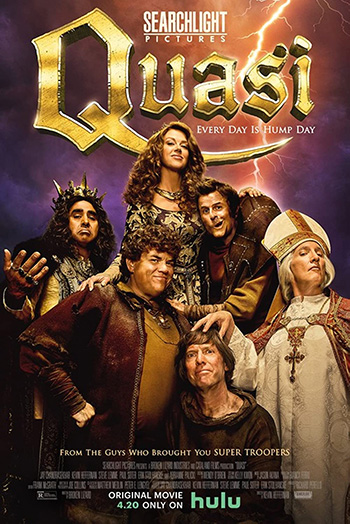
For those of you with a twisted sense of humor, I have a couple of film recommendations for you.
Just debuting this past week on Hulu – wholly unexpected to me – is the latest from the Broken Lizard comedy team, Quasi, the only Quasimodo movie that lacks a bell tower. I love Broken Lizard. They are masters of smart dumb comedy. The movie everyone knows – and most comedy fans adore – is Super Troopers. They write the scripts together and – with the exception of the crowdfunder Super Troopers 2, produced a decade and a half later – always go after a different subject or genre. Hence, Super Troopers 1 & 2 (cops), Club Dread (horror films), Beerfest (well, beer), Slamin’ Salmon (the restaurant game), and now Quasi (historical epic). Various team members have taken the “hero” role in these films, and various of them have directed, most often prolific TV director, Jay Chandraskekhar, although Kevin Heffernan directed both Slamin’ Salmon and Quasi.
The humor in Quasi comes from a cheerfully anachronistic approach to dialogue and a sweetness surprising for a film depicting somebody’s ballsack being nailed to a wooden block. It recalls Monty Python’s Holy Grail (the Broken Lizard guys each play multiple roles) and Start the Revolution Without Me, but despite the nonstop silliness, Quasi is more concerned with story than either of its two probable inspirations.
I watched it twice.
As I’ve mentioned before, a while back Barb and I saw Broken Lizard perform live at the Englert Theater in Iowa City and got to spend some time with them after. They were nice, normal human beings, funny and approachable, exhausted from the show they’d just presented but signing all of our DVDs and Blu-rays with patience and even joy. (Probably helped that I had their somewhat obscure first outing, Puddle Cruiser.)
Streaming on Peacock, the already notorious Cocaine Bear proves to be the funniest gory movie since Evil Dead 2. Its humor is a blend of Coen character eccentricities, Three Stooges slapstick, and jawdropping carnage. It’s largely about parenthood – specifically, motherhood. I realize some horror fans want it to be even gorier and dislike the amount of humor – for me, the fact that I’m laughing to the point of pain while watching humans getting torn apart strikes just the right balance.
Back Issue, an outstanding magazine on comics history, covered my brief run (one continuity) on the Batman comic strip. It’s really in depth with lots of Marshall Rogers art, and I would encourage you to seek it out.
Finally, here’s a decent Kirkus review of the imminently forthcoming Mad Money, collecting Spree and Mourn the Living, the last of Hard Case Crime’s reprint series of the Nolan novels.
M.A.C.
